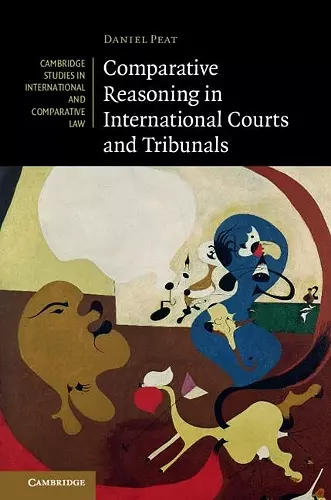Comparative Reasoning in International Courts and Tribunals
Format:Hardback
Publisher:Cambridge University Press
Published:13th Jun '19
Currently unavailable, and unfortunately no date known when it will be back
This hardback is available in another edition too:
- Paperback£30.99(9781108401470)

This book examines an unexplored method of interpretation: the use of domestic law in the interpretation of international law.
By adopting a comparative analysis of the practice of five international courts and tribunals, this book systematically describes and analyses the use of domestic law to interpret international law. The findings of the book, which blends doctrinal and theoretical approaches, will be of interest to practitioners and academic researchers alike.Domestic law has long been recognised as a source of international law, an inspiration for legal developments, or the benchmark against which a legal system is to be assessed. Academic commentary normally re-traces these well-trodden paths, leaving one with the impression that the interaction between domestic and international law is unworthy of further enquiry. However, a different - and surprisingly pervasive - nexus between the two spheres has been largely overlooked: the use of domestic law in the interpretation of international law. This book examines the practice of five international courts and tribunals to demonstrate that domestic law is invoked to interpret international law, often outside the framework of Articles 31 to 33 of the Vienna Convention on the Law of Treaties. It assesses the appropriateness of such recourse to domestic law as well as situating the practice within broader debates regarding interpretation and the interaction between domestic and international legal systems.
'Dr Peat has offered fresh insights into two under-studied topics - the place of domestic law in treaty interpretation and the comparative jurisprudence of international courts and tribunals. By calling attention to commonalities and distinctions among the approaches of various courts and identifying judicial practices that may not fit neatly into orthodox narratives, the volume promises to be valuable to scholars, practitioners and jurists alike.' Joan Donoghue, Judge of the International Court of Justice, Netherlands
'A very clear and revealing account of the use of domestic law by international courts and tribunals when interpreting international instruments and international law. This sheds helpful light on important matters of current legal interest.' Richard Gardiner, University College London
'Tribute must be paid to Daniel Peat for his masterful dissertation, offering a brilliant analysis of the complex issue of the interaction between domestic and international law in international dispute settlement. It explores the profound implications of this normative interaction, shifting the perspective to the comparative reasoning of international adjudicators. The analysis of different jurisdictional settings, the diachronic approach and the sharp reading of the case law make this book a fascinating piece of scholarship.' Hélène Ruiz Fabri, Director, Max Planck Institute Luxembourg for Procedural Law
'Throughout the book, Peat demonstrates attention to detail, a welcome appreciation for the insights of theory, and an impressively wide knowledge of international law and adjudication. The book sharpens thinking and blurs boundaries, adding yet further evidence of 'the complexity … of the international/national legal interface'. As this interface comes under increasing scrutiny, Peat's work will play an important guiding role.' Jarrod Hepburn, European Journal of International Law
'Peat's book is concise (a quality that the members of the jury found important) yet very substantial, innovative and highly stimulating. It is of great interest not only for the law and practice of international adjudication, but also for the theory of the sources of international law (general principles of law, relationship between domestic law and international adjudication, and relationship between comparative law and international law, which is a fascinating, emerging issue) and their interpretation. As such, it will provide any international lawyer with new insights and perspectives on core issues of general international law and will not doubt pave the way to future researches in the field.' 2020 European Society of International Law (ESIL) Book Prize jury,
'Peat seeks to explore “how and why domestic law is used by international courts and tribunals to interpret international law” by examining how adjudicators have engaged with “domestic legislation and regulations, and the judgments of domestic courts” when constructing and applying international legal materials.' The Law and Practice of International Courts and Tribunals
ISBN: 9781108415477
Dimensions: 234mm x 157mm x 17mm
Weight: 600g
292 pages